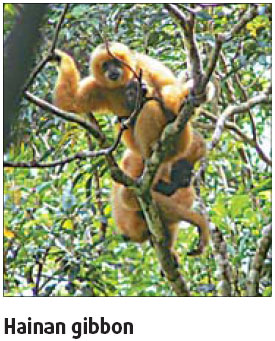The
Hainan black-crested gibbon has been included among the world's 25 most endangered primate species, according to a report being released today by three international conservation organizations in the southern island province.
The report is compiled by the World Conservation Union (IUCN) and the International Primatological Society in collaboration with Conservation International.
Other endangered species include the greater bamboo lemur in Madagascar, the Cross River gorilla in Nigeria and Cameroon, and the Roloway monkey in Cote d'Ivoire and Ghana. All the animals on the list are found in developing countries of Africa, Asia and South America.
"Poaching and shrinking habitats have been the two major reasons behind the sharp decline in the black-crested gibbon's population," Lu Gang, a conservation officer based in Hainan, said.
According to the report, about 2,000 lived across the island's 12 counties in the 1950s; but only 21 were found by the end of 1980s, all restricted to Bawangling Nature Reserve.
The most urgent need is to secure and expand the habitat for the remaining gibbons, said Lu, who works for Hong Kong-based Kadoorie Farm and Botanic Garden (KFBG).
Since 2004, KFBG has been helping the reserve grow pine trees around the gibbons' habitat. "We have grown 136 hectares of endemic plants in the reserve," Lu said. "After they grow to full size, they will provide more food to Hainan gibbons."
Thanks to the improved ecological situation, "we recorded three newborn gibbons this year," Bosco Chan, senior conservation officer of KFBG, told China Daily.
A joint survey by KFBG and the nature reserve in 2003 found two groups of gibbons, and two lone males, comprising a total of 13.
Since then, the organization has spent more than 1 million yuan (US$131,400) in supporting the reserve to monitor the gibbons and help restore their degenerated habitats, said Lu.
There have been no poaching cases for quite a few years, said Wang Wenyi, head of research of the reserve administration.
"To keep a closer eye on the gibbons, eight of our patrolmen have been monitoring the gibbons," Wang said. "We have to make sure that the gibbons will never suffer from poaching again.
(China Daily October 26, 2007)






